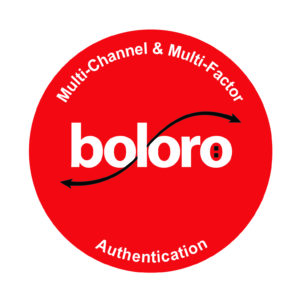Watch the video interview with CEO Karl Kilb:
A New Way To Authenticate & Pay
- What is the mission and vision of Boloro?
Boloro Global Limited is a New York City-based Delaware, USA corporation that is actively licensing its globally patented authentication technology worldwide for the security of mobile banking and payment apps, as well as logins for email, social media, access to data, and other activity.
Boloro’s mission and vision is to provide security through identity verification and transaction validation, using the mobile phone number and memorized PIN as unique identifiers, as well as the separation of the authentication process from the Internet and Operating System. Mobile banking and payment apps who adopt Boloro’s authentication technology can promote financial inclusion, transparency and fraud prevention by leveraging our identity verification and settlement/reconciliation reports.
Internet-based transactions are susceptible to fraud. Hackers routinely exploit the single point of failure.
The use of One-Time-Pins (OTP) is outdated and needs to be replaced because it is too susceptible to man-in-the-middle attacks that exploit the inherent issues of the Internet and Operating Systems.
In a similar way, biometric authentication can be too easy for fraudsters to replicate, and institutions are realizing that once a finger image is compromised in connection with any usage, it can never be relied on again. The storage of vast amounts of personal data, such as biometrics, is also of great concern to institutions who do not want the catastrophic problems and liability that could result from a data breach.
We believe that Boloro’s ATM-like approach to authentication is ideal for mobile payments, mobile banking and all ID verification.
- Why is trustworthy digital identity critical for existing and emerging markets?
The world is moving rapidly toward mobile payments and banking, including the migration from cash-based to digital transactions. We are also seeing a movement away from traditional points of sale and toward e-Commerce, further increasing the need for proper identity validation. Fraud is rampant in existing and emerging markets, and card-not-present fraud continues to climb steadily. Financial inclusion through mobile activity is necessary to develop emerging markets and to raise the prospects of those who are unbanked or unbanked in all markets. Security that is both bullet-proof and user-friendly is absolutely critical to the future of mobile payments and banking, as well as e-Commerce, and security starts with a trustworthy digital identity.
Boloro’s ATM-like, multi-channel and multi-factor approach to authentication avoids the Internet and the Operating System by separating the authentication message (sent via the secure signaling channel of the mobile phone) from the transaction (which is typically via an Internet-based app).
Boloro’s process allows you to proactively protect yourself. Boloro is compatible with any mobile phone, and a user-friendly, instantaneous way to protect your identity and to eliminate fraud.
- How will digital identity transform the Canadian and global economy? How does Boloro address challenges associated with this transformation?
Digital identity is the foundation of proper security, which is essential for all forms of mobile payments, mobile banking and e-Commerce.
Governments, financial institutions and others need secure, user-friendly and cost-effective ways to ensure the identity of those participating in all forms of financial activity, and Boloro is directly addressing these challenges by providing technology that is easy to adopt and compatible with any mobile phone, regardless of the manufacturer, allowing for uniform deployment.
As referenced above, Boloro’s ATM-like, multi-channel and multi-factor approach avoids the Internet and separates authentication from the transaction, putting real security in your own hands. Only you have your physical phone, and only you know your memorized PIN, which you enter into a flash text message sent via the secure signaling layer of the mobile carrier (away from the Internet and Operating System) to authenticate the applicable activity before it is processed.
- What role does Canada have to play as a leader in the space?
Canada should be promoting thought leadership in this space, focusing attention on best of breed technologies such as Boloro that can provide ID verification and transaction validation.
- Why did Boloro join the DIACC?
DIACC’s President recently saw a demonstration of Boloro’s technology and invited Boloro to join its organization. Boloro is proud to be a member of DIACC and to be working with DIACC to further thought leadership in the crucial areas of identity validation and transaction verification. We see DIACC as a global leader in this space and want to work actively with DIACC on these initiatives.
- What else should we know about Boloro?
Boloro is committed to identity verification through the use of the mobile phone number and memorized PIN as unique identifiers, as well as the separation of authentication from the transaction, and Boloro wants to use this commitment as a foundation to promoting financial inclusion, transparency and fraud prevention.
In addition to identity verification and transaction validation, Boloro’s patented authentication and mobile payments technology includes a complete settlement and reconciliation report that can be used to develop a credit history for individuals that can become the basis for establishing traditional banking and credit relationships.
 Over the past 12 months, our community of digital identity solutions and services experts and enthusiasts grew larger and stronger than ever. We’re proud to bring diverse individuals and organizations together to collaborate and advance digital identity. Our work throughout the year has focused on making strides in interoperability, innovation, and outreach for digital identification solutions.
Over the past 12 months, our community of digital identity solutions and services experts and enthusiasts grew larger and stronger than ever. We’re proud to bring diverse individuals and organizations together to collaborate and advance digital identity. Our work throughout the year has focused on making strides in interoperability, innovation, and outreach for digital identification solutions. authentication for digital citizen engagement. Anonymous authentication is the process by which a user is authenticated but, unless explicit permission is granted, the service and provider they are interacting with cannot access their identity.
authentication for digital citizen engagement. Anonymous authentication is the process by which a user is authenticated but, unless explicit permission is granted, the service and provider they are interacting with cannot access their identity. The
The  The
The  that asks: What do networks for identity look like, and how will they be secure, privacy-respecting, and convenient for Canadians – in terms of the technologies used and in terms of transparent governance?” Brennan says of digital identity trends that will shape 2018. “It’s an exciting evolution in how we solve digital identity for persons, organizations, and the relationships that matter in between.”
that asks: What do networks for identity look like, and how will they be secure, privacy-respecting, and convenient for Canadians – in terms of the technologies used and in terms of transparent governance?” Brennan says of digital identity trends that will shape 2018. “It’s an exciting evolution in how we solve digital identity for persons, organizations, and the relationships that matter in between.”